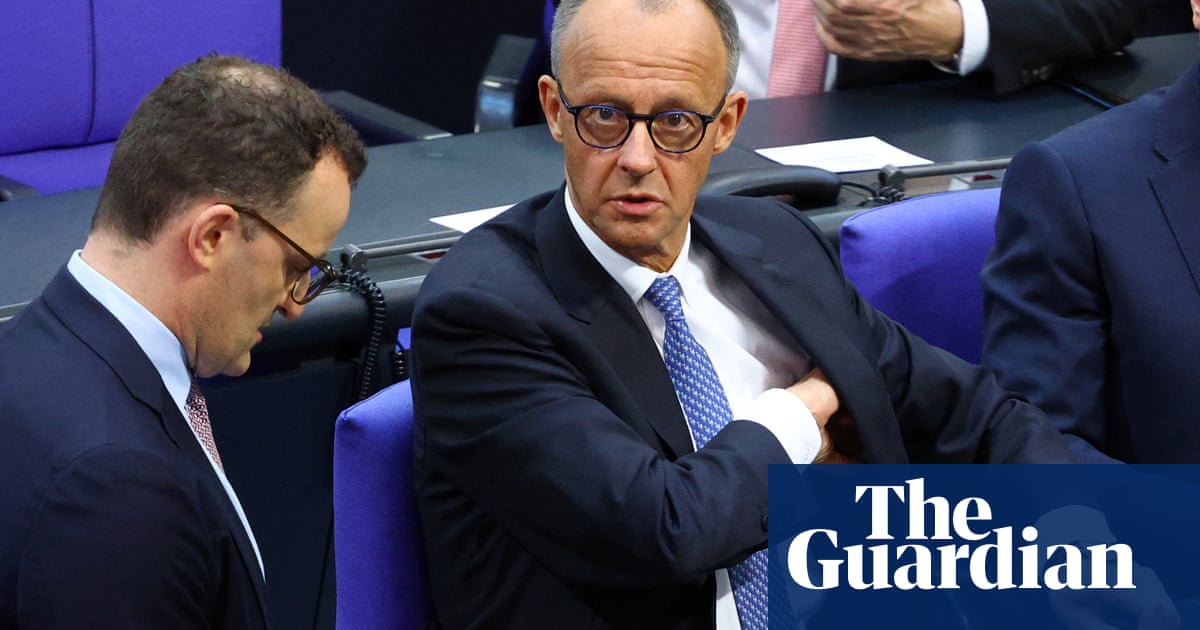Germany’s presumed next chancellor,Friedrich Merz, has suffered a humiliating setback on his path to power by failing to secure the necessary majority in the Bundestag lower house of parliament to be elected.
The ballot on Tuesday was the first time in Germany’s postwar history that a candidate has lost the first round of voting in a country that prides itself on predictability and stability.
Unconfirmed media reports said a second round of voting would be held on Friday and Merz was expected to stand again.
Commentators called the shock outcome, in which the centre-right leader garnered 310 votes, short of the required 316, a “complete catastrophe” for the conservative politician and “a punch to the stomach”. The 69-year-old leads the centre-right CDU/CSU bloc, which won February’s snap election with a disappointing 28.6%.
Immediately after the lost vote, a stony-faced Merz retreated with his parliamentary group to consult on the path ahead.
It was not immediately clear from the secret ballot whether it had been rebels among his own conservatives or from the junior coalition partners, the Social Democrats (SPD) who had withheld their expected support. Three abstentions were received as well as an invalid ballot.
The Social Democratic co-leader Lars Klingbeil, who has been designated to become Merz’s vice-chancellor and finance minister, reportedly told his MPs that he had “not the slightest indication that the SPD was not completely behind” Merz. “We can be counted on,” he insisted.
A failure by Merz to win in the second round would immerse Europe’s top economy into political turmoil, triggering an open-ended leadership battle or potentially even new elections in which the far-right Alternative für Deutschland (AfD) party would be expected to do well – or even win outright.
The AfD co-leaderAlice Weidelgleefully welcomed Merz’s debacle, posting on X that his failure win a majority in the first round “shows what a weak foundation the small coalition is built on”.
The developments throw a finely calibrated schedule for the week into disarray.
Merz had been due to be sworn in Tuesday and to travel to both Paris and Warsaw on Wednesday, signalling a return to German leadership within the EU after six months of political limbo since Olaf Scholz’s government collapsed in acrimony.
He had been due to preside over ceremonies marking the 80th anniversary of the end of the second world war in Europe on Thursday before heading to Brussels on Friday to meet EU and Nato leaders.
Merz hoped on Tuesday to become the 10th chancellor of the postwar period, facing an already staggering in-tray of domestic and foreign policy challenges unseen since national reunification 35 years ago.
The next government will have to revive the flatlining economy and fend off the far right while maintaining support for Ukraine against the backdrop of fresh uncertainty in the transatlantic relationship under Donald Trump.
Sign up toThis is Europe
The most pressing stories and debates for Europeans – from identity to economics to the environment
after newsletter promotion
Merz, a corporate lawyer who made a fortune in the private sector but has never led a state government or a ministry, promised “strong, well-planned and dependable governance … in times of profound change, of profound upheaval” as he signed thecoalition pacton Monday in Berlin.
“That is why we know that it is our historic obligation to lead this coalition to success,” he said, noting that partners keenly awaited a return of German stewardship in Europe.
Scholz’s Social Democrats turned in their worst performance in more than a century in February’s election, with just over 16%. Together with the CDU/CSU they have only a slim majority to pass a reform agenda in the Bundestag, where the anti-immigration, pro-Kremlin AfD forms the biggest opposition bloc.
Merz, however, has a deep popularity deficit among Germans, who mistrust his often brash style and mercurial temperament.
A poll last week for the public broadcaster ZDF showed thatonly 38% supported him as chancellorwhile a full 56% said he was the wrong person for the job. Merz is particularly disliked by Social Democrats, with 62% rejecting him, in a gloomy foreshadowing of Tuesday’s disaster.
The black-red coalition, named for the parties’ colours, had stronger backing than Merz himself at 48% while 37% oppose the alliance. Yet nearly one in two Germans do not think the new government has what it takes to solve the country’s most pressing problems.
